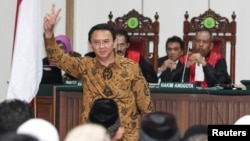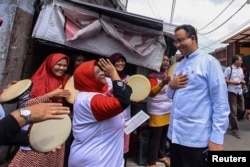Indonesians are voting Wednesday in more than 100 regional elections but Jakarta's gubernatorial race is attracting most of the attention.
It is a closely-watched contest between moderate and conservative forces in the world's most populous Muslim nation. Religion and race came to dominate the campaign in the city with some seven million voters after the current governor was accused of blasphemy.
Philips Vermonte of the Indonesian Center for Strategic and International Studies (CSIS) believes the Jakarta election is important because the outcome could influence national politics.
“For the past few months many people are concerned because old issues have resurfaced, especially on relations between the country and religion, or citizens' rights to be elected or to vote, pluralism, etc.,” Vermonte told VOA. “The religious issue in this election has created frictions that have made the capital seem to be more intolerant than any other parts of Indonesia. Therefore, I think the success of the February 15th gubernatorial election is a test not only for Jakarta's voters, but also for Indonesia.”
The incumbent governor, Basuki "Ahok" Tjahaja Purnama, is Indonesian Chinese and Christian, making him a double minority. Popular with middle-class residents for his efforts against corruption and to improve the quality of life, accusations against him of blasphemy —a criminal offense — surfaced in September and he is currently on trial. Protests against him culminated on Saturday, the last day of campaigning, with tens of thousands of Indonesians from around the nation gathering in Jakarta to listen to clerics who urged them to vote for Muslim candidates.
Both of Purnama's opponents, Agus Harimurti Yudhoyono and Anies Baswedan, are Muslims.
Yudhoyono, an Army major until he resigned to run, is the eldest son of Susilo Bambang Yudhoyono, a former president. Although the younger Yudhoyono lacks civilian job experience, he assured voters during his campaign that he is ready to be the next governor.
Baswedan is an academician and former minister of education in the government of President Joko “Jokowi” Widodo.
Siti Zuhro, a senior analyst with the Indonesian Institute of Sciences, LIPI, said the relative youth of the three gubernatorial candidates they're 38 to 50 years old — has generated enthusiasm among younger voters.
Baswedan “appeals to young netizens who are first-time voters,” said Zuhro. “They think he is cool and friendly.”
Yudhoyono appeals to local voters as a Jakarta native, according to Zuhro, who added that Purnama has seen his voter support drop in polls from over 50 percent to 30 percent since the blasphemy allegations surfaced.
Although “quick count” results compiled by researchers stationed at a sample of polling places will give an indication of the outcome within hours of the polls closing at 1 p.m. local time, the official results are not due until February 27. It's unlikely that any of the three candidates will get the 50 percent of the votes required for an outright win, which means there will be a runoff in April between the top two vote-getters.
Henri Satrio, an analyst at Jakarta's Paramadina University, said that one reason the gubernatorial election is attracting such attention is that when Joko Widodo won the governorship in 2012, he used that political momentum in 2014 and was elected president of Indonesia.
A second factor is the power behind each candidate, Satrio said. “Former president SBY (Yudhoyono) is behind the candidate Agus Yudhoyono, former president Megawati Sukarnoputri is behind Basuki Tjahaja Purnama, and former presidential candidate Prabowo Subianto is behind Anies Baswedan. Besides, previous incumbents have never won re-election, so if Ahok (Purnama) is re-elected it would be a historical moment.”
And then there is factor of religion.
“I think what we are seeing is probably more of an elite-based conflict,” said Vermonte. “I am confident that our people generally are still moderate as evidence shows that in the other 100 regional elections, the issue of religion is non-existent. But conservative elements have been mobilized by the elite groups, who have no creativity and are unwilling to fight fair in the election. And religious or anti-ethnic issues are the easiest tool to use.”


